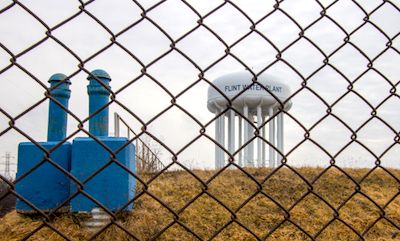The Role of Primary Care Physicians in Public Health Advocacy: Lessons from Flint.
 Viewpoint articles are written by members of the SPH community from a wide diversity of perspectives. The views expressed are solely those of the author and are not intended to represent the views of Boston University or the School of Public Health. We aspire to a culture where all can express views in a context of civility and respect. Our guidance on the values that guide our commitment can be found at Revisiting the Principles of Free and Inclusive Academic Speech.
Viewpoint articles are written by members of the SPH community from a wide diversity of perspectives. The views expressed are solely those of the author and are not intended to represent the views of Boston University or the School of Public Health. We aspire to a culture where all can express views in a context of civility and respect. Our guidance on the values that guide our commitment can be found at Revisiting the Principles of Free and Inclusive Academic Speech.
On April 25, 2014, Flint, Michigan city officials switched the city’s water supply from Lake Huron to the Flint River as a cost-cutting measure, in what would become one of the most massive public health crises in recent US history. The crisis was a hard lesson in how a lack of accountability and transparency by public officials can expose communities to harm.
The Flint Water Crisis has also shown how primary care physicians (PCPs) can emerge as public health advocates not only for their patients but also for their communities, by documenting objective risk and harm to protect the most vulnerable populations. In 2015, Flint pediatrician Dr. Mona Hanna-Attisha and a team of public health researchers issued a clear warning to residents that the drinking water was dangerous. The incidence of lead poisoning among Flint’s children had more than doubled following the switch in the water source, and disadvantaged neighborhoods experienced an almost three-fold increase. After city and state officials refused to heed her warnings, Hanna-Attisha and colleagues held a press conference to release their findings and demand action, leading the city to eventually declare a state of emergency.
Primary care, by definition, is inextricably linked to public health. In addition to disease prevention and health maintenance, PCPs are often gatekeepers, being the first to recognize patterns of illness and disease in their communities. Those who work in underserved communities commonly engage in patient advocacy and education—an orientation that has hopefully been imbued in their clinical training. It is less common, however, for PCPs to engage in advocacy and activism outside clinic walls.
Fiscal pressures on physicians are perhaps the greatest barrier to their engagement in public health advocacy. For example, in 2018, US physicians saw an average of 20 patients per day, and about one-third of physicians spent about 17 to 24 minutes with a patient on average. Providers often do not have the time to look beyond the illness that is right in front of them to try to make sense of what might be happening at the community level. Given these concrete limitations, PCPs must be committed and empowered to learn about specific public health problems when they arise locally, but they must also recognize when they should seek expertise outside of the medical field to address these problems.
PCPs need to be proactive about seeking collaborators in the community to help identify public health problems and advocate for change. Local grassroots organizations that focus on a particular social justice issue can be a conduit for physicians to reach advocacy networks and policymakers. PCPs can leverage their status as respected professionals in the community by insisting that they have a seat at the table among stakeholders, as they are uniquely qualified to speak to problems that they see working directly with patients and families. Helping to write opinion pieces such as op-eds in collaboration with grassroots organizations that already may have the ear of policymakers is one way that PCPs can help raise awareness of a particular public health issue to drive policy change.
The Flint Water Crisis laid bare the existing vulnerability of the city, but few people would be surprised if “Flint” were to happen again in another high-poverty area of the United States. Had it not been for one primary care physician and a small team of public health experts who emerged as activists, resulting morbidity from lead poisoning in Flint could have been far worse. The lessons learned from Flint deserve every PCP’s attention and commitment to work for better public health by being strong patient advocates inside—and outside—the clinic.
Julia Noguchi is the assistant director of the Doctoring Program at the Warren Alpert Medical School of Brown University and a part-time doctoral student and Activist Bucks awardee at SPH.